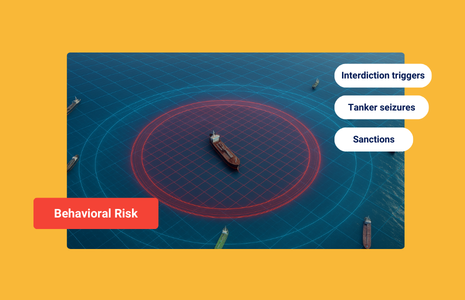Bulk Carriers in the Crosshairs – Weekly Roundup

What’s inside?
Bulk carriers now find themselves in the Houthis’ crosshairs, after two separate vessels were attacked late last week. Windward’s insights show that a week before the recent attacks, bulk carriers’ traffic in the Red Sea increased drastically. It seems that the Houthi rebels took notice…
This week’s Maritime Global Trade Roundup has all the statistics and details you need about this situation, including a look at dark activity and the potential environmental impact.
It also looks at the revenue loss in the Suez Canal and a recently sanctioned company that is part of the shadow fleet. Enjoy these actionable Maritime AI™ insights!
Recent Red Sea Attacks – Bulk Carriers in the Crosshairs
- The Houthis carried out an attack on a merchant vessel, the MV Verbena (IMO: 9522075), on June 13. It’s a Palauan-flagged cargo vessel that was recently purchased by a Polish company, “Dtschart Sp Z O O.” It was headed towards Venice, Italy, carrying construction material.
- Public sources reported that the vessel was damaged and one mariner was severely injured. The crew issued a distress call on June 13 at 0:45 p.m. (Sanaa time) indicating that they were forced to abandon ship due to fires onboard. The crew was picked up by another merchant vessel in the area.
- The Verbena departed the port of Songkhla, Thailand, on May 20, 2024, updating its destination to Venice. On May 25, after crossing the Malacca Strait, the vessel entered the Indian Ocean and the Arabian Sea for the first time. It entered the Gulf of Aden on June 10 and on June 13 conducted a dark activity 123 nautical miles (NM) off the port of Aden, Yemen, corresponding with the time of the attack.

- The Houthis also attacked a Greek-owned bulk carrier carrying coal, the Tutor, on June 12. On June 14, public sources reported that the Tutor’s crew was forced to abandon ship due to the damage the vessel suffered from the attack.
- The UK Maritime Trade Operations reported that the vessel is currently drifting in the Red Sea unmanned northeast of Djibouti. This is the third incident in which a crew has abandoned ship due to Houthi attacks, including the Rubymar (March 2024) and Verbena attacks. On June 18, the UKMTO reported that the Tutor might have sunk. Optical satellite imagery shows that the vessel was located in the EEZ of Eritrea, at 14°19’57″N, 41°55’32″E, on June 14. Based on later images, the vessel drifted West, and was seen on June 15 at 14°18’24″N, 41°52’35″E and on June 16 at 14°21’9″N, 41°44’29″E. Since June 17, the vessel could be seen in the area, suggesting that the vessel might have sunk.

- These attacks have a major influence on maritime trade, and as seen in the case of container vessels at the beginning of the Red Sea Crisis, bulk carriers are now being targeted by the Houthis. Windward’s data shows that a week before the recent attacks, bulk carriers’ traffic in the Red Sea increased drastically on a weekly basis. There was a 162% increase in the number of area visits by bulk carriers in the Red Sea and Gulf of Aden regions between the weeks of May 26-June 1 and June 2-8. This was followed by a 50% decrease during the week of June 9-15, 2024.
There has been an increase in the number of area visits since the middle of May 2024. The numbers for June 2-8 show the highest number of area visits in the Red Sea and Gulf of Aden by bulk carriers in the past three years! - There was a 366% increase in the number of dark activities conducted in the Red Sea and Gulf of Aden by bulk carriers between the weeks of May 19-May 25, and June 2-8. The following week, the number decreased by only 14%. The week of June 2-8 saw the largest number of dark activities by bulk carriers in the Red Sea and Aden Region in the past two years. This increase happened before the latest attacks and might correlate to the increase in dry-bulk traffic. As more vessels arrived at the Red Sea, it is possible that more vessels turned off their AIS to hide their location, to avoid an attack.
- It should be noted that the recent attacks highlight a major problem – the environmental issue. Abandoned vessels, like the Rubymar, are at risk of sinking, which can result in damages to infrastructure (such as cables) and to marine life caused by oil and cargo spillage.
- The Houthis have escalated their war efforts and increased the number of attacks on merchant vessels since mid-April. The recent rise in bulk carrier area visits prior to the attacks last week might indicate that the Houthis responded to the increase, as seen in past events.
Based on past data concerning container vessels, it could be expected that bulk carrier traffic in the Red Sea will decrease in the following weeks, majorly impacting the supply chain. Bulk carriers will be forced to circumnavigate via The Cape of Good Hope, causing more delays and price increases in bulk cargo, plus higher carbon emissions caused by the longer journey.
The Red Sea Crisis Effect on Maritime Trade – Revenue Loss in the Suez Canal
- Since the beginning of the Red Sea crisis, there has been an ongoing decrease in the volume of merchant vessels that sailed through the area. As previously mentioned, this was caused by vessels re-routing their sailing paths and circumnavigating via The Cape of Good Hope to avoid attacks carried out by the Houthi rebels from Yemen.
- This caused several problems in maritime trade, such as shipping delays and slower supply chains, resulting in port congestion. The situation also caused major losses in revenues for the Suez Canal Authority – approximately $337.8 million in May 2024, which is a 64.3% decrease compared to May 2023.
- Windward’s data shows that since December 31, 2023, there has been a low volume of cargo vessels crossing the Suez Canal, as seen in the number of unique cargo vessels that conducted area visits in the canal on a weekly basis. The data shows that during the week of June 9-15, 2024, only 110 vessels crossed the canal, an all-time low since March 2021. Based on Windward’s Early Detection model, there has been a change of process in January 2024, showing a lower number of vessels crossing the Suez Canal than usual.

- Windward’s data shows that the month of May 2024 has seen the lowest number of area visits by cargo vessels in the Suez Canal in the past three years. It is 51% lower than average area visits in the Suez Canal. In addition, the data shows a 57% decrease in area visits in the Suez Canal by cargo vessels when comparing May 2023 and May 2024, which closely matches the loss in revenue reported by open sources.
The Red Sea crisis resulted in major losses for the maritime industry, such as revenue losses both for freighters, ports, and the Suez Canal Authority. Using Windward’s data can help better understand the Red Sea Crisis’ impact.
UK Sanctions Against the “Shadow Fleet”
- The UK announced new sanctions designated against 50 individual entities for their relation with Russia on June 14, including vessels that are possibly part of Russia’s “shadow fleet.”
- One of the companies targeted by the sanctions is One Moon Marine Services, a UAE-based company, alleged to assist with Russia’s oil flow and to contribute to the shadow fleet. Windward data shows that the company owns five vessels – four crude oil tankers and one oil products tanker, all sailing under the Cook Islands flag, a flag of convenience. Based on Windward’s data, One Moon Marine Service’s crude oil tankers conducted four commodity ship-to-ship (STS) meetings in June 2024 , two of which were conducted in Morocco’s EEZ.
- There might have been a new formation of a Russian oil STS hub in Morocco in June 2024. Based on Windward’s data, between December 2023-June 2024 there was a 150% increase in the monthly average of commodity STS meetings between dark/gray fleet vessels and crude oil tankers in the EEZ of Morocco.
- Given that between January-May 2024 no STS engagements were detected in the area, it is possible that Morocco might have become a new STS hub after the Greek EEZ became less accessible, due to the Greek navy drills in May-June 2024.
- While overall the numbers are considered low, the One Moon Marine Services activity might have an effect on other vessels. Public sources reported that the Rolin (IMO: 9286073), a Vietnamese-owned and flagged VLCC received crude oil via STS operations from three Aframax tankers in Morocco – two of which are owned by One Moon Marine Services
- The Rolin departed fully laden en-route to Vietnam after concluding the meetings. Windward data shows that two of the three Aframax tankers are owned by One Moon Marine Services
- Windward’s insights also show that both vessels owned by One Moon Marine Services arrived at the Moroccan EEZ from the port of Primorsk, Russia, and conducted long STS engagements with the Rolin between June 6-8, 2024.


As more countries in the EU, U.S., and rest of the world start to crack down on Russia’s Sovcomflot vessels and initiate sanctions aimed at limiting Russia’s oil trade, there is an increase in dark and gray fleet activity to sell sanctioned oil. Windward’s system can help reduce the risk of trading with sanctioned and risky vessels, and being implicated in sanctioned activity.
Trending
- The EU’s 18th Sanctions Package Lookback Started. Trading Russian Products? You're At Risk. Nov 24, 2025
- Tanker Freight Rates Hit Five-Year High Amid Russian Oil Sanctions Shake-Out Nov 6, 2025
- Sanctioned, Stateless, and Still Sailing: Expert Insights from the Frontlines of Maritime Sanctions Nov 3, 2025











